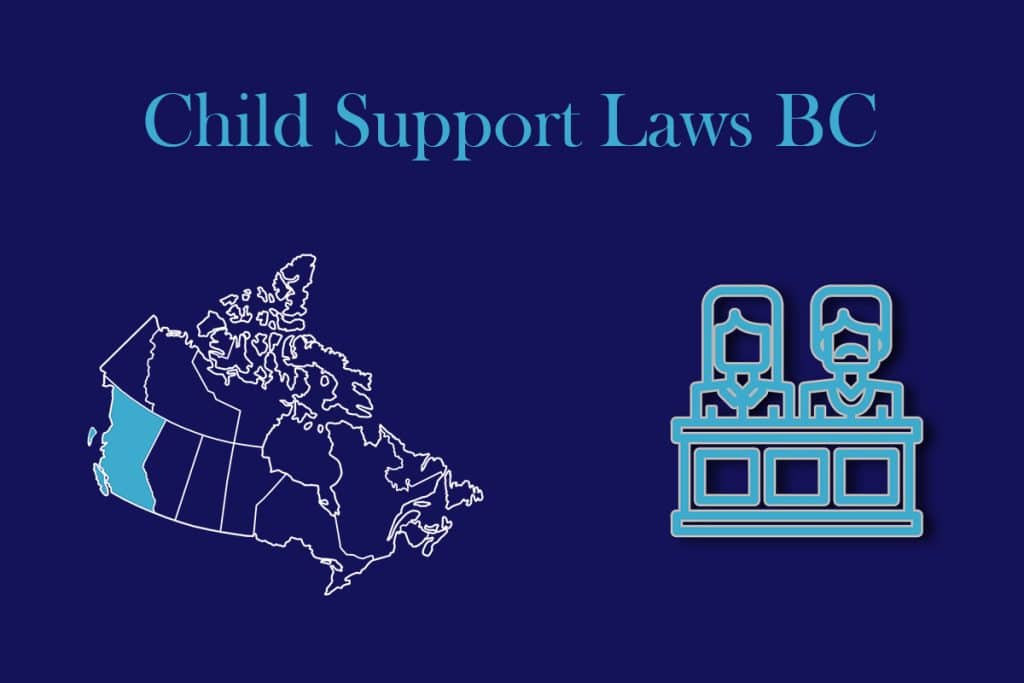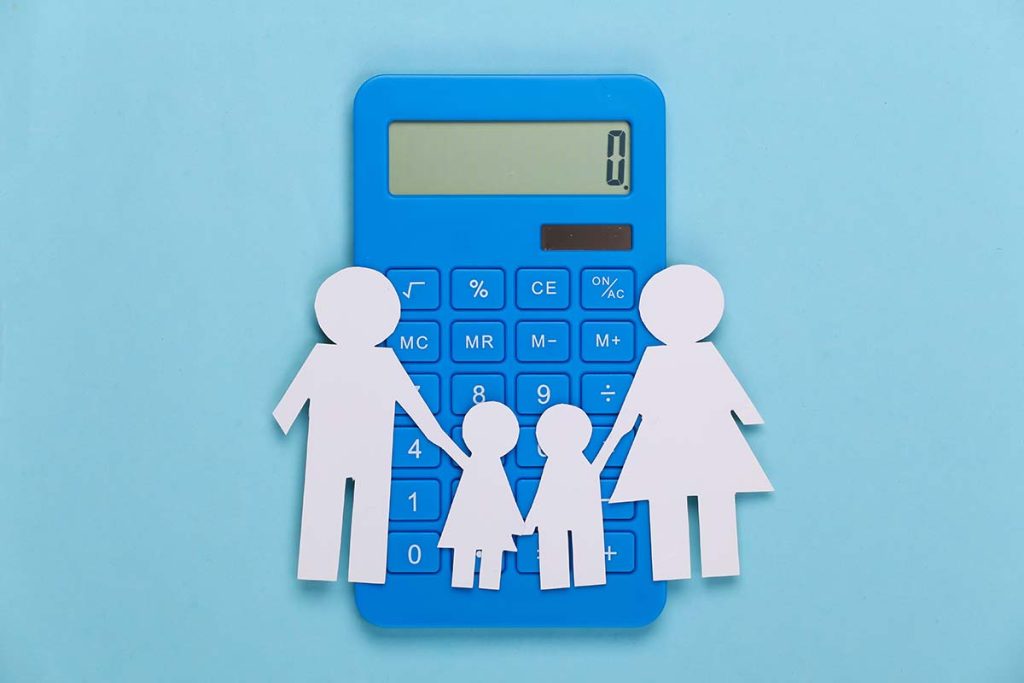
- How does child support work in British Columbia?
- Can a father refuse to pay child support in British Columbia?
- How to lower your child support obligation in BC
- How to reduce child support obligation in British Columbia. Mediation or litigation?
- How to apply for child support in British Columbia
- What happens if you do not pay child support in British Columbia?
- How long do you have to pay child support in BC?
- Do you have to pay child support if you give up your parental rights in British Columbia?
Quick take on British Columbia Child Support Laws:
How does upkeep work in BC?
- Parents must provide upkeep until the child turns 19 in British Colombia.
- Failure to provide upkeep will result in the penalties listed below.
- Provincial laws require the court to use federal tables to estimate upkeep.
- The court may deviate from the guidelines.
- Either parent may request an increase or decrease in support obligation.
- If you are above 16, you may sue your parent for support through a litigation guardian. You may also apply for “Youth Agreement.”
- If you are above 19, you may apply to become a guardian to your siblings.
- You must get your parents to agree or a court order to get legally married in British Columbia if you are below 19.
- If a child leaves home before turning 19, the parents have a legal obligation to provide financial support.
References
We recommend consulting with a family court attorney.
How does child support work in British Columbia?

British Columbia child support laws work under the assumption that “a child has a right to be supported by both parents in the same way if the parents lived together.” Although, in theory, both parents must pay support, however, the higher-earning parent often pays support.
The province’s Family Law Act and federal government child support guidelines determine parental obligation and how much you must pay as support.
How to calculate/estimate child support obligation in British Columbia

The federal government provides look-up tables that you may use to estimate your obligation. It is worth noting that the estimate you get from using the tables linked below may be different from your court order. Why?
Provincial laws require the court to consider the best interests of the child. If the situation demands it, the judge may deviate from the table.
Use this table to estimate child support amounts for the period between 2011 to 2017.
Can a father refuse to pay child support in British Columbia?
British Columbia’s family law act defines a parent as (1) The natural parent/s of the child. (2) The guardian/s of the child. (3) Stepparents. Consequently, if you are the father or mother, you have a legal obligation to provide support. Refusing to pay may result in the consequences listed below.
Do stepparents have to pay child support in BC?
As mentioned, if you are or were a stepparent, the law considers you a parent to the child, meaning you may have to pay support. Also, if you get a divorce, you still have an obligation to pay support.
British Columbia child support laws: what to remember
- A stepparent who lives and contributes to the support of a child for at least one year may have to pay support.
- A step parents’ duty to pay upkeep is secondary to that of the natural parent’s or guardian’s duty in BC.
The statute reads in part, quote:
“A child’s stepparent does not have a duty to provide support for the child unless (a)the stepparent contributed to the support of the child for at least one year, and (b)a proceeding for an order under this Part, against the stepparent, is started within one year after the date the stepparent last contributed to the support of the child.”
Factors the Court considers when determining child support obligation in British Columbia
Under provincial laws, the court and parents must consider the child’s best interest when designating parental support obligations and arrangements. “Best interest of the child” refers to factors including:
- The family’s history of care.
- The condition of the home. Is there any violence? A history of abuse?
- The child’s emotional and physical wellbeing
- Relationship between the child and the parents.
The court may also consider the child’s views.
The court may deviate if quote:
“a court may order child support in an amount different from that required by the child support guidelines if(a)the parties consent under section 219 [persons may consent to order being made] or have an agreement respecting child support, and(b)the court is satisfied that reasonable arrangements have been made for the support of the child.”
Also, the court may reduce or increase the payor’s obligation if:
- The payor’s income is above $150,000 per year.
- If child support payments cause undue hardship on the payor.
- The child is a stepchild.
- The payor spends at least 40% of the parental time with the child
How to lower your child support obligation in BC
As mentioned, the court may reduce parental obligation if (1) The payor suffers undue hardship because of child support payments. (2) The paying parent spends more time with the child. (3) If the child is a stepchild. It is also possible for the custodial parent to ask for an increase in payments on the condition that (1) The payor’s income changes. (2) The current amount is not sufficient.
Why the payor should regularly update income changes
If your income increases, the custodial parent may apply for a retroactive increase in payment. You may also apply for an increase if the payor failed to disclose their income properly.
If that happens, the court may order the payor to pay a lump sum or increase payments.
If you are the payor and your income reduces, you may ask the court for a retroactive decrease in your obligation.
When to apply for child support reduction in British Columbia
- When your income changes or when you become involuntarily unemployed. Involuntary unemployment means that you lost your job through no fault of your own. If you voluntarily leave your job to reduce your obligation, the court will likely deny your request for reduction.
- Disability or disease. You may suffer a sudden disability or an illness that affects your ability to earn. If so, you may apply for a reduction.
- The custodial parent’s income changes. If the custodial parent’s income increases because of cohabitation, employment, or other factors, the payor may apply for a reduction.
- Increase your parenting time. If custodial arrangement changes -say the child decides to live with the paying parent or spend more time- the payor may apply for a reduction.
How to reduce child support obligation in British Columbia. Mediation or litigation?
If the parties fail to agree, you may choose litigation or mediation. However, litigation can be expensive, and there is no guarantee of a positive outcome. We, therefore, recommend that you consult with an attorney.
Mediation is a less expensive alternative.
If you opt for mediation, British Columbia’s Family Resolution Center offers expert assistance and self-help tools that you may use to settle the issue.
Apply for child support mediation here.
Parents may make an informal child support agreement out of court
After a divorce or separation in British Columbia, the parents do not need to go to court to determine parental obligation. Instead, the parties may decide to make an informal child support agreement.
What is vital to remember is that if you make an informal child support agreement in British Columbia, you should file it with the court registry here.
What if the other parent refuses to pay?
To enforce informal child support, you must enroll with the Family Maintenance Enforcement Program (FMEP).
FMEP: What to remember
- FMEP is a free service that allows parents to enforce child support agreements.
- If a parent refuses to pay support, FMEP may take enforcement actions, including driver’s license cancellation, passport denial, federal interception, and notice of attachment.
- A written agreement made after separation or when the parents are about to separate is binding and enforceable under the FMEP act.
How to apply for child support in British Columbia

British Columbia’s family law act allows a child’s parent or guardian to apply for support. You may apply against the child’s natural parent or a stepparent if the conditions mentioned above apply.
Remember, section 4 reads, quote:
“The making of an order against one person for the support of a child does not affect the liability of, or prevent the making of an order against, any other person responsible for the support of the child.”
What happens if you do not pay child support in British Columbia?
If the payor refuses to provide support, the custodial parent may enforce the child support order or an out-of-court agreement enrolled with FMEP. The consequences for failing to pay child support in British Columbia include:
- Seizure of tax returns.
- Passport denial or revocation.
- Suspension/revocation/denial of licenses, including driver’s license, professional license, or your hunting, fishing, or boating license.
- Garnishment of income. May include wages, workers’ compensation, and old age security benefits.
- Credit bureau reporting
- Seizure of assets or bank accounts.
Is not paying child support a criminal offense in Canada?
Yes. Willful failure to pay child support is a crime in Canada. Under Canadian law, failure to pay upkeep is a criminal offense that may result in up to six months in jail and a $5000 fine. Why?
One of the options FMEP has -is to suspend the payor’s federal license or passport. Failure to return the documents requested in the notice may result in the penalties above.
Another reason you may go to jail for failing to pay child support is contempt of court. You may face contempt of court charges if you refuse to obey a court order. In British Columbia, Contempt of Court charges carry a maximum sentence of 45 days in jail.
You must remember that in child support cases, jail time is usually the last resort.
How long do you have to pay child support in BC?
The Age of Majority in British Columbia is 19. Consequently, your obligation ends on the child’s 19th birthday. However, depending on the parental agreement, your obligation may continue until the child turns 21.
If the child has special needs, support may continue indefinitely.
We recommend checking your parental order. Also, read and understand parental agreements before you sign.
Do you have to pay child support if you give up your parental rights in British Columbia?
Provincial laws allow parents to give up their rights under two conditions (1) The parents agree that one of them no longer has to be a guardian. (2) One parent may apply for a court order.
It is also worth noting that you may lose your parental right if you have zero contact with the child for at least six months.
If you are above 16, you may apply for Youth Agreement in British Columbia via the link above.
Other British Columbia Laws